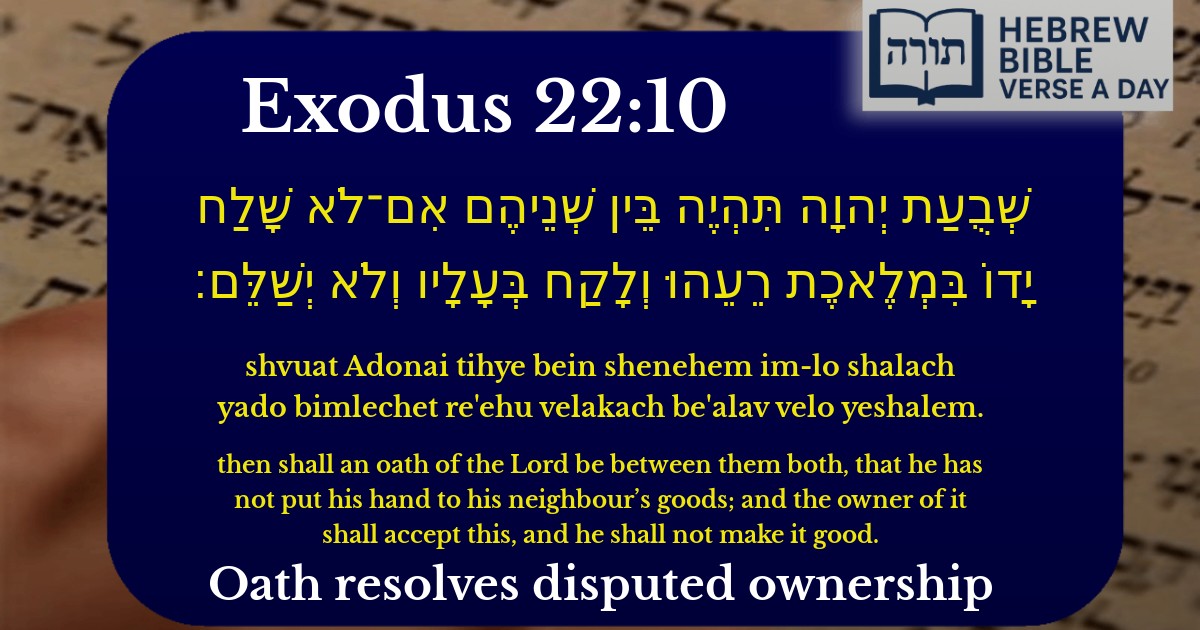Join Our Newsletter To Be Informed When New Videos Are Posted
Join the thousands of fellow Studends who rely on our videos to learn how to read the bible in Hebrew for free!
Hebrew Text
שְׁבֻעַת יְהוָה תִּהְיֶה בֵּין שְׁנֵיהֶם אִם־לֹא שָׁלַח יָדוֹ בִּמְלֶאכֶת רֵעֵהוּ וְלָקַח בְּעָלָיו וְלֹא יְשַׁלֵּם׃
English Translation
then shall an oath of the Lord be between them both, that he has not put his hand to his neighbour’s goods; and the owner of it shall accept this, and he shall not make it good.
Transliteration
Shvuat Adonai tihye bein shenehem im-lo shalach yado bimlechet re'ehu velakach be'alav velo yeshalem.
Hebrew Leining Text
שְׁבֻעַ֣ת יְהֹוָ֗ה תִּהְיֶה֙ בֵּ֣ין שְׁנֵיהֶ֔ם אִם־לֹ֥א שָׁלַ֛ח יָד֖וֹ בִּמְלֶ֣אכֶת רֵעֵ֑הוּ וְלָקַ֥ח בְּעָלָ֖יו וְלֹ֥א יְשַׁלֵּֽם׃
Parasha Commentary
📚 Talmud Citations
This verse is quoted in the Talmud.
📖 Shevuot 38b
The verse is discussed in the context of the laws of oaths, particularly regarding disputes over property and the requirement of an oath to resolve such matters.
📖 Bava Metzia 3a
The verse is referenced in a discussion about the responsibilities and liabilities of a bailee (someone entrusted with another's property) and the role of oaths in such cases.


Context in Jewish Law
The verse (Shemot 22:10) discusses the halachic procedure when one person entrusts an item to another (a shomer), and a dispute arises over whether the item was stolen or lost. The Torah mandates that the matter be resolved through a shevu'at Hashem (an oath before G-d).
Rashi's Explanation
Rashi (ad loc.) clarifies that this oath is administered by the court (beit din). The shomer swears that he did not misuse the entrusted item ("im-lo shalach yado b'melachat re'ehu"—"if he did not put his hand to his neighbor's goods"). If he takes this oath truthfully, he is exempt from paying compensation.
Rambam's Legal Analysis
In Hilchot She'eilah u'Pikadon (1:1-2), the Rambam elaborates that this oath applies specifically to an unpaid guardian (shomer chinam). The Torah establishes this legal safeguard to prevent false claims while protecting the rights of both parties. The owner must accept the oath, as the verse states: "v'lakach be'alav v'lo yeshalem" ("the owner shall accept this, and he shall not make it good").
Talmudic Discussion (Shevuot 44b)
The Talmud explains that the oath is only valid if:
Midrashic Insight (Mechilta d'Rabbi Yishmael)
The Mechilta emphasizes the gravity of swearing falsely in G-d's name. The phrase "shevu'at Hashem" underscores that this is not merely a legal formality but a sacred act invoking Divine judgment. One who violates this oath transgresses the prohibition of shevu'at shav (vain oaths).
Practical Halachic Implications
Later poskim, such as the Shulchan Aruch (Choshen Mishpat 87:1), rule that if the shomer refuses to take the oath, he must pay the claim in full. This demonstrates the Torah's balance between protecting property rights and ensuring justice through sworn testimony.